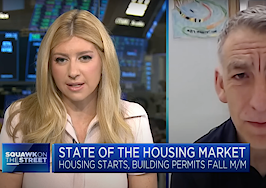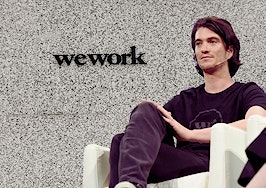In these times, double down — on your skills, on your knowledge, on you. Join us Aug. 8-10 at Inman Connect Las Vegas to lean into the shift and learn from the best. Get your ticket now for the best price.
When David Shum was relocating from Boston to Salt Lake City for work, he knew he’d have a little wiggle room in his budget for a spacious two-bedroom apartment in a walkable neighborhood in the city’s arts district downtown.
And at the newly constructed Pierpont Apartments in Downtown Salt Lake City, Shum and his wife quickly found a gem of a unit asking $800 less than what they were paying for a two-bedroom in Boston — and room to spare for their two dogs.
That is, until the couple noticed the hidden fees, which included a whiplash-inducing $70 application fee, a $200 lease initiation fee, a mandatory $145 technology package, a $65 parking fee and two separate fees for their beloved dogs — a one-time $300 charge, and another recurring monthly fee of $70.
The add-ons, Shum told Inman, amounted to an effective 15 percent rent hike before he and his wife walked through the front door of his new apartment.
“There are definitely parts of it that seem unfair,” Shum said of the fees, which he had avoided in Boston, “and there are other fees that I think are reasonable.”
Reasonable or not, Shum’s junk fee dilemma is playing out in agreements between renters and landlords across the country as mandatory fees proliferate and housing advocates call for increased transparency over the often hidden costs of renting. Indeed, earlier this month, the Biden administration made a call to eliminate “hidden fees, charges, or add-ons,” and suggested states enact legislation that would reduce such costs, which landlords and property managers increasingly leverage as new revenue streams in addition to rent.
The increased scrutiny on junk fees comes as rent continues to rise at a break-neck speed that accelerated during the pandemic and is now 30 percent higher than in July 2019, according to the Zillow’s Observed Rent Index. The typical price of rent in the U.S. is now $2,053, up from $1,580 four years ago, according to Zillow, leading one former renter to call the added fees, “severely predatory.”
And as part of the effort to raise awareness of the fees, three major rental listing platforms — Zillow, Apartments.com and AffordableHousing.com — have agreed to make changes that highlight the various costs of renting.
“These fees are often more than the actual cost of providing the service, or are added onto rents to cover services that renters assume are included — or that they don’t even want,” the White House said in a statement last week.
In interviews with Inman, renters, independent landlords and property managers revealed how “junk fees” have substantially increased the cost of housing for millions of renters.
The mandatory ‘peace-of-mind package’
When renter Jenna Williams sought to move out of the home she shared with roommates into a new apartment in Salt Lake City with her partner, she was moderately surprised by one landlord’s prohibition on alcohol in the building.
But it was Utah, the East Coast native reasoned, a state where residents overwhelmingly count themselves as members of The Church of Jesus Christ of Latter-day Saints, which advises against alcohol consumption. Instead, it was a $29.95 “peace-of-mind-package” that shocked her most during her search.
“It included monthly [furnace] filters, which my old landlord would just drop off,” Williams said. “Rent reminders, 24/7 maintenance requests, which I would say is already a responsibility of landlords, and online payment processing.”
Landlords are just making fees up these days pic.twitter.com/YG3Ea6ul8t
— Jenna Williams (@JennaWilliamsUT) April 18, 2023
In effect, Williams was paying a fee to pay rent, she said, which can also apply to things like utilities in apartments.
“For every property management company that was posting [listings], they had so many more fees,” Williams recalled to Inman. “When you have to pay a security deposit and first month’s rent at the same time, you add on the $250 fee and the background check, it’s super expensive.”
Shum said he’s required to pay a $3.75 fee to know what he owes in water and sewer each month.
There also may be regional differences between the upfront costs of getting into a rental.
In Boston, Shum said he was required to pay a non-refundable broker’s fee equal to a full month’s rent to execute a new lease and get into a rental.
“I’ve definitely heard of people having to pay $10,000 up front just to move in there even when rent would just be like $3,000,” Shum said.
Others pointed to lease agreements that required the renters to pay $25 a month for pest control on top of non-refundable “lease initiation” fees.
Multiple renters pointed to a lease initiation fee as a barrier that added more upfront costs to housing. For Ethan Peck, a dispute with a property management company over a $474 lease initiation fee left him out the money and drove him to buy a house instead of rent one, he said.
“The biggest problem I see here is that these fees and tactics are severely predatory, especially for folks who don’t have the time to do the research, are on a tighter budget, and just say, ‘It’s not worth the effort to fight for this fee’ after they realize they’re not going to have it refunded or applied to their security deposit,” Peck said.
The focus on fees has led Zillow, Apartments.com and other platforms to build new tools aimed at giving U.S. renters more insight into what they should expect to pay to get into a rental and then each month after that.
Platforms add fee transparency
In the U.S., renters typically submit two applications for rental housing during a search, according to a Zillow survey of renters obtained by Inman set for an upcoming release.
Most of them, 84 percent, reported paying an application fee that was typically $50. After that, many are obligated to pay another $500 to $999 security deposit, according to Zillow.
Zillow was one of two major rental platforms to announce a new tool aimed at providing better transparency around fees.
In a statement to Inman, the company said this week its “Cost of Renting Summary” would help both renters and landlords who list rentals on Zillow.
“The Cost of Renting Summary was built to empower renters with another tool to help them better understand and navigate the market, thus delivering more informed leads to our partner,” a Zillow spokesperson said via email. “The tool is available nationwide on all active apartment listings on Zillow, and we are working closely with our multifamily partners to ensure Zillow has all applicable fees for each building.”
Apartments.com, a company under the CoStar umbrella that is competing for market share for residential listings, also said it would unveil a tool later this year that would display a calculator that would help renters figure out the all-in price for getting a particular rental.
“This will include all up-front costs as well as recurring monthly rents and fees,” the company said in a statement to Inman. “The Apartments.com Network currently lists almost 1.5 million active. availabilities across more than 385,000 properties.”
Jay Parsons, chief economist at the rental data firm RealPage, responded by saying transparency would be a win-win for the industry.
“In fairness, every industry has bad actors,” Parsons said. “It’s reasonable to crack down on bad actors failing to disclose significant fees — especially if renters are not made aware of those fees prior to signing a lease.”
Congress takes a closer look
The Senate Committee on Banking, Housing and Urban Affairs is set to hold a hearing on Wednesday that examines “junk” fees in the rental housing market and beyond. Representatives from multiple states are set to testify.
As part of the announcement last week about Zillow’s new policy, the U.S. Department of Housing and Urban Development pointed to legislation in various states that it said could help to drive down costs.
Colorado allows renters to reuse a rental application for a month without having to pay another application fee, a service that is also available on Zillow, Apartments.com and other tenant-landlord services.
“We let the renter put in the email of other landlords. We’ll provide those reports to landlords with no extra costs incurred by anyone,” said Michael Lucarelli, CEO of RentSpree, which provides services to renters and landlords. “Some landlords just want easier and quick access to things. They don’t want to go and do these things on their own.”
The White House also pointed to other states that have capped application fees (Rhode Island), mandated fee reporting (California and Minnesota), and prohibiting certain move-in and move-out fees (Connecticut).
Passing those kinds of laws may be an uphill battle in some states.
Nate Blouin, a Democratic state senator in Utah, is one of the Legislature’s only renters. During a recent move, he faced similar initiation fees and told Inman he’d just prefer fees to be advertised in the total rent price and more flexibility for renters to not have to pay for, say, a mandatory technology fee.
“You can find internet a lot cheaper than $100 a month,” Blouin told Inman. “Most people don’t have TV these days and already pay for other sh*t.”
He said it seemed like property managers and landlords are making extra money each month through fees.
“If you own an apartment complex you might be making an extra $5,000 a month on fees,” he said.
He acknowledged other states that have capped fees, and said he’d look for a policy change that could pass in a landlord-friendly state like Utah. But he didn’t hold out much hope for passage.
“It’s dead on arrival,” he said.
Get Inman’s Property Portfolio Newsletter delivered right to your inbox. A weekly roundup of news that real estate investors need to stay on top, delivered every Tuesday. Click here to subscribe.















